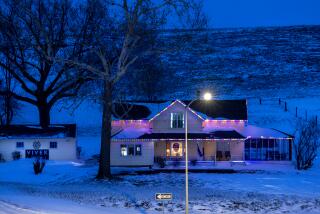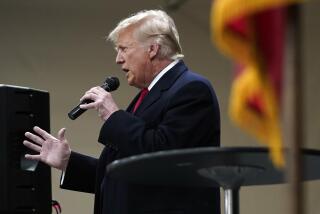Iowa’s economy a winner
When bartender Jessica Nelson was offered the chance to work overtime during the final weeks of caucus season here at the downtown Marriott Hotel, she eagerly canceled her holiday plans.
These are boom times in the Corn State: The tips she’s earned from serving high-end martinis and bottles of microbrewed beers over the last couple of weeks are at least double her normal take -- far better than even a New Year’s Eve party.
Nelson, 25, hopes to use her bonus from the caucus circus to pay off a new brown velvet couch and a pair of leather ottomans. “At this time of year, it’s normally dead,” she said. “Everyone says this is the biggest [caucus] ever.”
That may be the case, as early reports estimate that spending across the board -- from hotels and tourism to media advertising sales -- is at an all-time high.
Much of this is thanks to an aggressive, last-days push by candidates battling in two wide-open races, all eager to woo Iowans.
“The Iowa economy is a winner in all of this,” said Shawn Roland, a spokesman for the Iowa Department of Economic Development. “There’s the simple fact that the caucus draws a ton of people to come here, and spend money here, that wouldn’t otherwise do so.”
Roland said he understood the benefits and occasional frustrations that could come from living through such short-term spending booms.
He and his wife spent weeks trying to find a restaurant that had a table free on New Year’s Eve, which fell in the midst of the last big campaign push for candidates.
Normally, diners would find plenty of options if they were willing to face the icy winter chill for a nice evening out. But this year, their only options were to eat at 4 p.m., or wait until nearly 11 p.m.
“We decided to get sushi to go,” Roland said. “Then, we hit a caucus media party. It wasn’t so much romance as it was raucous.”
But while the economic trickle-down of this quadrennial political tradition is richly enjoyed in certain sectors, at least one Iowa economist says the financial impact on the state is actually neither as broad nor as deep as it might seem from the crowded streets of downtown Des Moines.
Instead, it’s “like having another state fair come to town every four years,” said David Swenson, an economist with Iowa State University who has researched the issue.
Some media reports have pegged the caucus revenues this year at about $50 million to $60 million, which he said, is about what the Iowa State Fair generates. “By my measure, that’s pretty paltry, considering the spectacle,” Swenson said.
Indeed, life is a series of political photo ops for residents here every four years -- and has been since 1972, when then-Sen. George S. McGovern of South Dakota had a strong showing in Iowa, which helped him land the Democratic nomination. Four years later, former Georgia Gov. Jimmy Carter won Iowa and the White House.
Swenson said the direct economic effect of the caucus was mostly felt in the state’s two largest cities -- Des Moines and Cedar Rapids -- where a flurry of media, campaign workers and curious political tourists routinely snap up hotel rooms, pack into restaurants and empty the rental car lots.
His research found that every $10 million spent in Iowa on media advertising translates into about $5 million worth of local labor income, and every $10 million spent on rental cars, food and accommodations supported about $4.8 million in local service income.
Such an assessment, not surprisingly, rankles some Iowans who have fought hard in recent months to preserve the state’s first-in-the-nation position in the frenzied presidential race.
Unlike previous caucus seasons, candidate spending here has been heavily bolstered by outside groups throwing in tens of millions to cover the cost of thousands of additional TV ads that have run in the last month alone.
As a result, residents have been bombarded in recent days by back-to-back-to-back candidate ads on TV and radio stations across the state. Still, the final tallies of how much cash was spent in the Hawkeye State probably will not be clear until the Federal Election Commission releases reports on the various candidates’ fourth-quarter campaign spending later this year, economist Harvey Siegelman said.
By then, most of the political dollars will have long left this state, whose gross domestic product in 2006 was estimated to be nearly $124 billion, according to the U.S. Department of Commerce’s Bureau of Economic Analysis.
Campaign money spent in Iowa is not on the same level as what you see in mall sales during Christmas, Siegelman said.
“But that’s not the point. Iowa’s issues and strengths are highlighted on a national platform every four years, which is the kind of publicity no state could afford to buy,” said Siegelman, who was Iowa’s state economist for two decades until his retirement in 2001. “That’s the true benefit to this state and our economy.”
--
p.j.huffstutter@latimes.com
Mehta reported from Des Moines, Huffstutter from Chicago.
More to Read
Get the L.A. Times Politics newsletter
Deeply reported insights into legislation, politics and policy from Sacramento, Washington and beyond. In your inbox three times per week.
You may occasionally receive promotional content from the Los Angeles Times.







